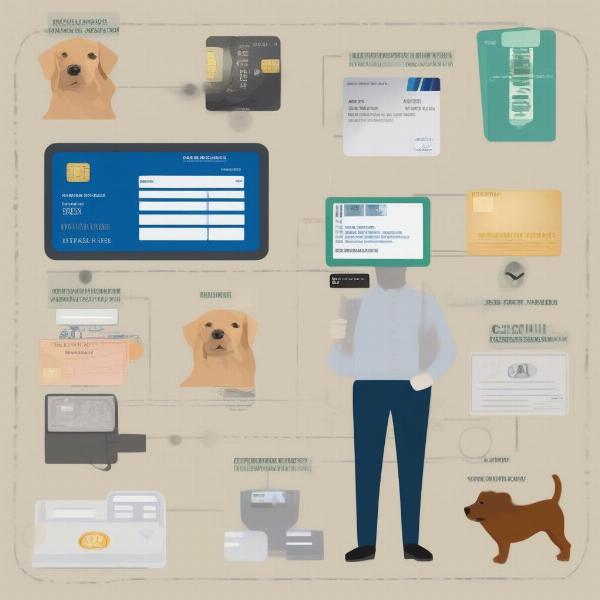Getting a dog license is a crucial part of responsible dog ownership. It not only helps ensure your dog’s safety but also demonstrates your commitment to your community. This article will guide you through the process of obtaining a dog license, explaining where to get one, the necessary requirements, and the associated fees.
Locating Your Local Licensing Authority
The first step in getting a dog license is identifying the correct licensing authority. This typically varies depending on your location. In most cases, dog licenses are issued by your local city or county animal control department, animal shelter, or clerk’s office. Some areas may also allow online registration, making the process even more convenient.
Understanding the Requirements for a Dog License
While the specific requirements might differ slightly depending on your location, there are some common elements. Almost all jurisdictions require proof of current rabies vaccination. This is crucial for public health and safety. Some areas might also require proof of other vaccinations or a health certificate from a veterinarian. Be prepared to provide information about your dog, such as breed, age, and color.
What to Expect: Fees and the Application Process
Dog license fees vary depending on factors like your location, the dog’s age, and whether it’s spayed or neutered. Generally, the fees are relatively low and significantly less expensive than the potential fines for having an unlicensed dog.  Paying Dog License Fee
Paying Dog License Fee
The application process itself is typically straightforward. You’ll need to complete an application form, provide the necessary documentation, and pay the required fee. Many jurisdictions offer online applications, which can save you time and effort. If applying in person, ensure you have all the required documents to avoid multiple trips.
Why Licensing Your Dog is Essential
Licensing your dog is more than just a legal requirement; it’s a vital part of responsible pet ownership. A license acts as a form of identification, which can be crucial in reuniting you with your dog if it gets lost. It also helps animal control authorities track and monitor dog populations, contributing to public health and safety initiatives.
Common Questions About Dog Licensing
What if I move?
If you move to a new location, you’ll typically need to obtain a new dog license from your new local authority. Check their specific requirements, as they might differ from your previous location.
What happens if my dog loses its tag?
If your dog loses its license tag, contact your local licensing authority to request a replacement. There might be a small fee for a new tag.
Beyond Licensing: Other Responsibilities of Dog Owners
Beyond licensing, responsible dog ownership involves various other aspects, including providing proper nutrition, regular veterinary care, training, and socialization. Ensure your dog has a safe and enriching environment, and be a responsible member of your community by cleaning up after your dog and keeping it under control in public spaces.
Conclusion
Obtaining a dog license is a simple yet essential responsibility for every dog owner. By understanding the process and fulfilling the requirements, you contribute to the safety and well-being of your dog and your community. Remember to contact your local animal control or city/county clerk’s office to learn the specific regulations in your area. Don’t delay – get your dog licensed today!
FAQs
-
How much does a dog license cost? The cost varies depending on your location, your dog’s age, and whether it’s spayed/neutered. Check with your local licensing authority for the exact fee.
-
What if my dog is a service animal? Service animals typically still require licenses, although some areas may have exemptions or reduced fees. Contact your local authority for specific guidelines.
-
Where can I get a dog license application? Applications are typically available online or at your local animal control office, animal shelter, or city/county clerk’s office.
-
What do I need to bring to apply for a dog license? Generally, you’ll need proof of rabies vaccination and sometimes other vaccinations or a health certificate. Be ready to provide information about your dog, such as breed, age, and color.
-
What happens if I don’t license my dog? You could face fines or other penalties. More importantly, an unlicensed dog is harder to return to you if it gets lost.
-
How long is a dog license valid? Licenses are typically valid for one year and need to be renewed annually.
About ILM Dog
ILM Dog (ilmdog.com) is your trusted international resource for comprehensive dog care and training information. We cover everything from breed selection and health to nutrition, behavior, and product recommendations. Whether you’re a new dog owner or a seasoned expert, ILM Dog offers valuable insights and practical advice to help you provide the best possible care for your canine companion. For any inquiries or expert assistance, feel free to reach out via email at [email protected] or call us at +44 20-3965-8624.